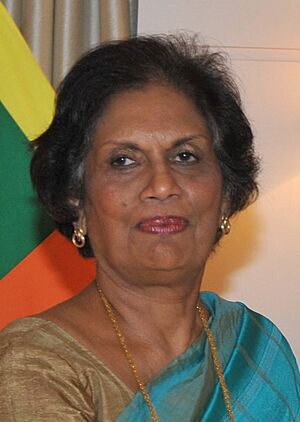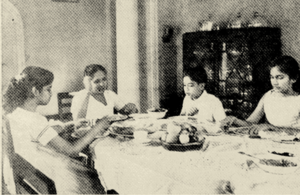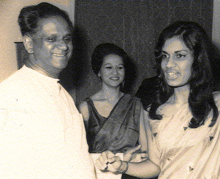Chandrika Kumaratunga facts for kids
Quick facts for kids
Chandrika Kumaratunga
|
|
|---|---|
|
චන්ද්රිකා කුමාරතුංග
சந்திரிகா குமாரதுங்க |
|

Kumaratunga in 2015
|
|
| 5th President of Sri Lanka | |
| In office 12 November 1994 – 19 November 2005 |
|
| Prime Minister | Sirimavo Bandaranaike Ratnasiri Wickremanayake Ranil Wickremesinghe Mahinda Rajapaksa |
| Preceded by | Dingiri Banda Wijetunga |
| Succeeded by | Mahinda Rajapaksa |
| 11th Prime Minister of Sri Lanka | |
| In office 19 August 1994 – 12 November 1994 |
|
| President | Dingiri Banda Wijetunga |
| Preceded by | Ranil Wickremesinghe |
| Succeeded by | Sirimavo Bandaranaike |
| Chairperson of the Sri Lanka Freedom Party | |
| In office 19 August 1994 – 19 November 2005 |
|
| Preceded by | Sirimavo Bandaranaike |
| Succeeded by | Mahinda Rajapaksa |
| Member of Parliament for Gampaha |
|
| In office 19 August 1994 – 12 November 1994 |
|
| Majority | 464,588 Preferential Votes |
| 2nd Chief Minister of the Western Province | |
| In office 21 May 1993 – 20 August 1994 |
|
| Governor | Suppiah Sharvananda D. M. Swaminathan |
| Preceded by | Susil Moonesinghe |
| Succeeded by | Morris Rajapaksa |
| Personal details | |
| Born |
Chandrika Bandaranaike
29 June 1945 Colombo, British Ceylon |
| Political party | Sri Lanka Freedom Party |
| Other political affiliations |
People's Alliance (1994–2004) United People's Freedom Alliance (2004–2006) |
| Spouse | |
| Children | Yasodhara Kumaratunga Vimukthi Kumaratunga |
| Parents | Solomon Bandaranaike (father) Sirimavo Ratwatte (mother) |
| Residence | Horagolla Walauwa |
| Education | Institut d'Études Politiques d'Aix-en-Provence Institut d'Études Politiques de Paris |
| Signature |  |
Chandrika Bandaranaike Kumaratunga (Sinhala: චන්ද්රිකා බණ්ඩාරනායක කුමාරතුංග; Tamil: சந்திரிகா பண்டாரநாயக்க குமாரதுங்க; born 29 June 1945), often called CBK, is a Sri Lankan politician. She served as the fifth president of Sri Lanka from 1994 to 2005. She is the longest-serving president in Sri Lankan history. She also led the Sri Lanka Freedom Party (SLFP) during her time as president.
Born into a famous political family, Chandrika is the daughter of two former prime ministers, Solomon Bandaranaike and Sirimavo Bandaranaike. She started her political journey in the 1970s, focusing on helping people and developing rural areas. After some years away from Sri Lanka following the tragic death of her husband, Vijaya Kumaratunga, she returned in the late 1980s.
In 1993, she was elected Chief Minister of the Western Province. The next year, she became the leader of the Sri Lanka Freedom Party and formed the People's Alliance. This group won the 1994 parliamentary elections. Later that year, she became the first female president of Sri Lanka. She won by a large margin, getting almost 62% of the votes.
During her time as president, Kumaratunga tried to make peace with the Liberation Tigers of Tamil Eelam (LTTE). This was an effort to end the country’s long civil war. She also helped modernize her political party, the SLFP. She introduced economic policies that supported a market economy while still focusing on fairness and social support. This helped improve the economy and made her party more popular.
Her government also worked to bring back normal public life after a period of violence and instability in the late 1980s and early 1990s. She focused on strengthening democratic rules and reducing violence to create more political stability. In 1999, she survived an assassination attempt during her re-election campaign. She then won a second term as president.
Contents
Early Life and Family Background
Chandrika Bandaranaike was born on 29 June 1945, in Colombo. Her parents were Solomon West Ridgeway Dias Bandaranaike and Sirima Ratwatte Dias Bandaranaike. Her family moved to a mansion in Rosmead Place, Colombo, a year later. They also spent time at Horagolla Walauwa, their family's old home.
Her father, S. W. R. D. Bandaranaike, was a lawyer educated at Oxford. He was a nationalist and left-wing politician. He founded the Sri Lanka Freedom Party (SLFP) in 1951. He became the Leader of the Opposition in 1952 and prime minister in 1956. As prime minister, he brought in important changes. These included taking over bus companies and the Port of Colombo. He also made Sinhala the country's only official language. He was sadly killed in 1959 when Chandrika was fourteen.
After her father's death, her mother, Sirimavo Bandaranaike, took over the SLFP. In 1960, she led the party to victory. She became the world's first female prime minister. So, Chandrika grew up surrounded by politics. She was the second of three children. Her older sister, Sunethra Bandaranaike, became a socialite. Her younger brother, Anura Bandaranaike, became a cabinet minister and Speaker of the Parliament of Sri Lanka.
Education and Studies
Chandrika went to school at St Bridget's Convent, Colombo. She then started studying law at Aquinas University College, Colombo. However, in 1967, she left Sri Lanka for France. She received a scholarship from the Institute of French Studies. She spent a year learning French language and culture.
In 1968, she went on to study at the Institut d'Etudes Politiques de Paris (Sciences Po). She earned a diploma in political science in 1970. After that, she started a PhD program in development economics in Paris. She studied there from 1970 to 1973. Chandrika is fluent in Sinhala, English, and French.
Early Steps in Politics
Chandrika returned to Sri Lanka in 1972. Her mother was prime minister for the second time. She joined the SLFP, the party her father founded. In 1974, she became a member of the executive committee of the party's Women's League.
She was appointed to the Land Reforms Commission. This commission took over a lot of private land for the state. Later, she became the chairman of the Janawasa Commission. This commission set up collective farms on the land acquired. After her mother's government lost the 1977 election, she left government service. She worked as a consultant for the Food and Agriculture Organization of the United Nations until 1979.
Forming a New Party
In 1978, she married Vijaya Kumaratunga. He was a famous actor and political activist. She supported his election campaigns. In 1984, she left the SLFP when Vijaya Kumaratunga started his own party, the Sri Lanka Mahajana Pakshaya (SLMP). She became the vice president of the SLMP. This caused some disagreements with her mother and brother, who were leading the SLFP.
On 16 February 1988, Vijaya Kumaratunga was tragically killed in front of his home. Chandrika Kumaratunga briefly took over the leadership of his party. She then formed the United Socialist Alliance with other parties. Fearing for her safety, she left Sri Lanka in 1988. She went to live in the United Kingdom for a while. There, she worked for the World Institute for Development Economics Research at the United Nations University.
Returning to Sri Lankan Politics
Chandrika started visiting Sri Lanka again in 1990. She became active in politics once more. In 1991, she permanently returned and rejoined the SLFP. She quickly became involved in political activities. In 1993, she was elected as the Chief Minister of the Western Province. This was a big step in her political career.
Becoming Prime Minister (1994)
In 1994, general elections were called. Chandrika became the main leader of the SLFP. She formed a group called the People's Alliance. This group won the general elections. Chandrika was elected to parliament from the Gampaha District in August 1994.
With a small majority in parliament, the People's Alliance formed a government. Chandrika became prime minister on 19 August 1994. Her mother also served as a minister in her cabinet. Chandrika also took over from her mother as the leader of the SLFP. Soon after, presidential elections were announced for November.
Presidency (1994–2005)
First Term as President (1994–1999)
Prime Minister Kumaratunga ran for president with the support of the People's Alliance. She was against Gamini Dissanayake, who was the opposition leader. However, Dissanayake was killed, and his wife, Srima Dissanayake, took his place. Chandrika won the presidential election in 1994 with 62.28% of the votes. She became the first female president of Sri Lanka in November 1994. She then appointed her mother to be the new prime minister.
Economic Changes During Her Presidency
Her government continued the open economic policies that were already in place. This meant encouraging trade and foreign investment. Key sources of income for the country grew. These included the clothing industry, money sent home by Sri Lankans working abroad, and tea exports. Her government also worked on modernizing some state-owned businesses.
Efforts for Peace and Stability
Early in her presidency, she tried to make peace with the Tamil Tigers (LTTE). This was an attempt to end the ongoing civil war. However, these peace efforts did not last. The LTTE broke the ceasefire in April 1995. After this, she focused more on military actions against them. Her government launched several major operations, like Operation Riviresa, which helped take back the Jaffna peninsula from the LTTE.
Her government, led by Foreign Minister Lakshman Kadirgamar, also worked to improve Sri Lanka's standing in the world. They succeeded in getting the LTTE banned internationally. The United States and the United Kingdom declared the LTTE a banned organization. This helped cut off a major source of money for the group. Her government also re-established official diplomatic ties with Israel in 2000. Israel became an important supplier of weapons to Sri Lanka.
Second Term as President (1999–2005)
In October 1999, Kumaratunga called for an early presidential election. She was injured in an assassination attempt by the Tamil Tigers during her final election rally in December 1999. Despite this, she won the election against Ranil Wickremasinghe and was sworn in for her second term.
During her second term, the civil war became more intense. Her government faced some major challenges against the LTTE.
- Working with a Different Government (2001–2004)
In December 2001, her party, the People's Alliance, lost the parliamentary election. Her political opponent, Ranil Wickremasinghe, became the new prime minister. She remained president, but her relationship with Wickremasinghe's government was difficult.
In February 2002, Wickremasinghe's government and the LTTE signed a permanent ceasefire agreement. This opened the way for peace talks. However, President Kumaratunga felt that Wickremasinghe was being too soft on the LTTE. In November 2003, she took control of the Defense, Interior, and Media ministries herself.
- Forming a New Alliance (2004–2005)
In January 2004, Kumaratunga's party and the leftist Janatha Vimukthi Peramuna (JVP) formed the United People's Freedom Alliance (UPFA). They won the election in April 2004. The UPFA formed a government with Mahinda Rajapaksa as prime minister. This was the first time the JVP was part of a Sri Lankan government.
Kumaratunga's six-year term as president ended in 2005. She argued that her term should be longer because the 1999 election was held a year early. However, the Supreme Court decided that her term ended in 2005. In the presidential election that followed, Mahinda Rajapaksa won and became the next president. In 2005, Forbes magazine listed her among the "100 most powerful women" in the world.
After Her Presidency
In 2006, Chandrika Kumaratunga stepped down from leading the SLFP. She then left Sri Lanka for a time and lived in the United Kingdom.
She is a member of the Council of Women World Leaders and the Global Leadership Foundation. She also often speaks at events for the Clinton Global Initiative. In 2007, Kumaratunga said she truly tried to find a political solution to the ethnic issues in Sri Lanka. She aimed to create a constitution that would meet the needs of the Tamil people without dividing the country.
Involvement in Recent Elections
On 21 November 2014, Kumaratunga announced her return to active politics. She supported Maithripala Sirisena as the opposition's candidate in the 2015 presidential election. Sirisena defeated Mahinda Rajapaksa. In the same year, Kumaratunga also supported the United National Party in the general elections. This was to prevent Rajapaksa from becoming prime minister. In 2015, she was appointed chairperson of the Office for National Unity and Reconciliation. This role focuses on promoting national unity in Sri Lanka.
In the 2018 Maldivian presidential election, Kumaratunga played a key role. She helped bring together different opposition leaders to form an alliance against the president at the time. During the 2018 Sri Lankan constitutional crisis, she remained quiet. She later said she was not invited to a special meeting of her party. For the 2019 Sri Lankan presidential election, Kumaratunga supported Sajith Premadasa.
Personal Life
Chandrika married actor and politician Vijaya Kumaratunga in 1978. He was tragically killed on 16 February 1988. This happened outside their home, with Chandrika and their two young children present.
Their daughter, Yasodhara Kumaratunga, was born in 1980. She studied at Corpus Christi College, Cambridge and St George's, University of London. She became a medical doctor and married Roger Walker, also a doctor. Their son, Vimukthi Kumaratunga, was born in 1982. He studied at the University of Bristol and became a veterinary surgeon.
Awards and Recognition
| Ribbon bar | Honour | Date |
|---|---|---|
| Commander of the Legion of Honour | 2018 |
See also
 In Spanish: Chandrika Kumaratunga para niños
In Spanish: Chandrika Kumaratunga para niños
- List of political families in Sri Lanka
- President of Sri Lanka
 | Claudette Colvin |
 | Myrlie Evers-Williams |
 | Alberta Odell Jones |



